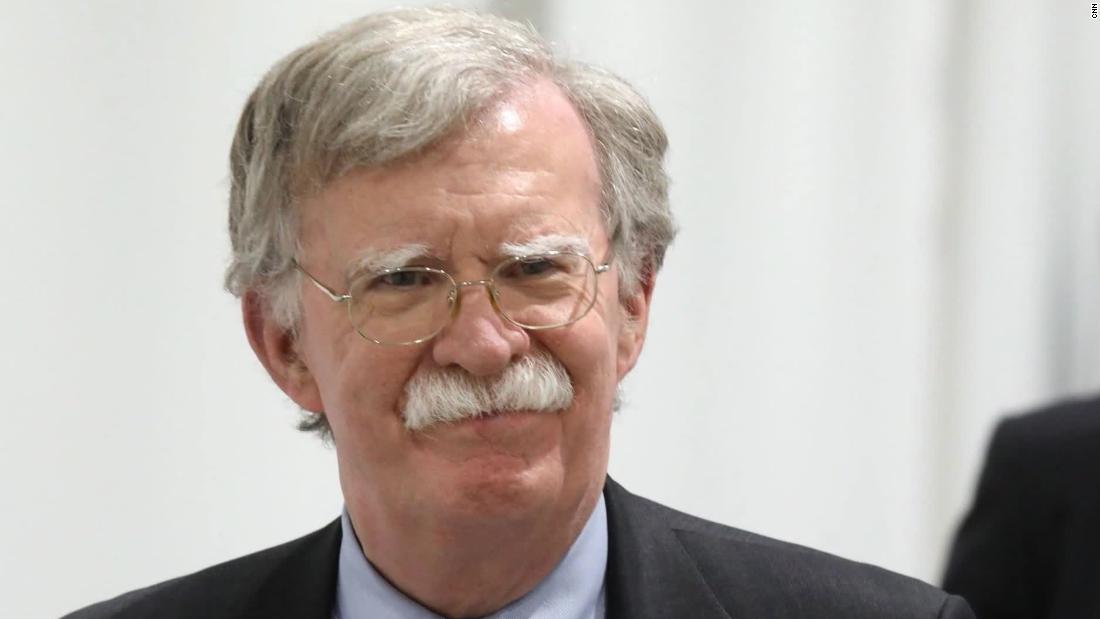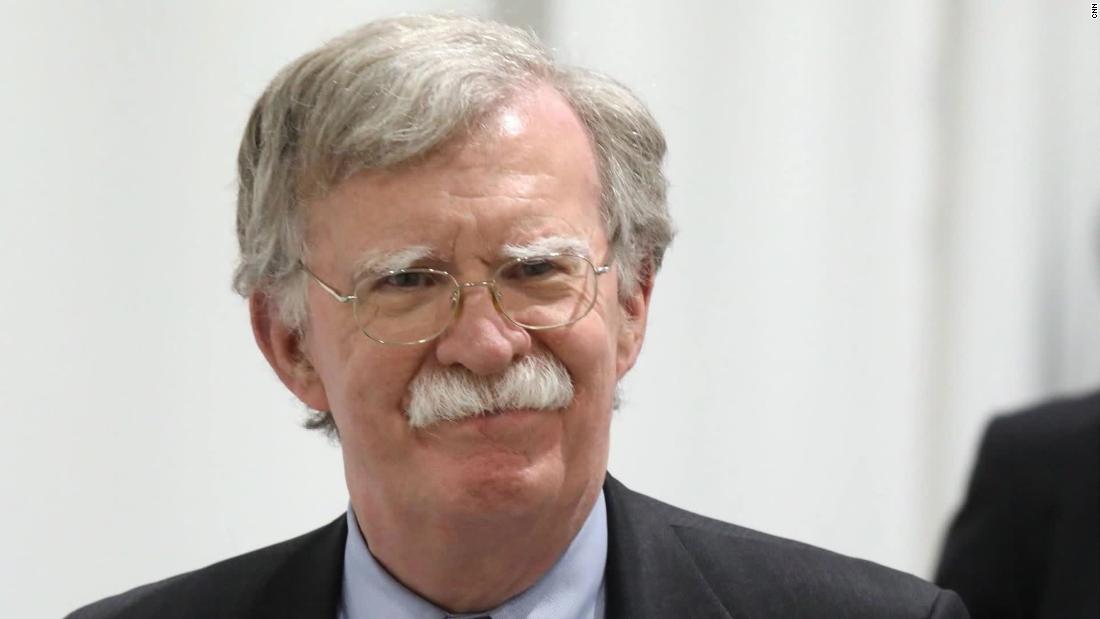[ad_1]

When it looked like House impeachment investigators might proceed without him, former national security adviser John Bolton, somewhat jilted, demanded that they try harder. Here’s what happened, along with other news Friday wrapping up a crazy busy impeachment inquiry week.
Bolton, according to his lawyer, has some information you might be interested in. He attended “many relevant meetings and conversations that have not yet been discussed in the testimonies thus far.”
Bolton is all over the testimony, in particular, of former White House Russia adviser Fiona Hill, who quoted him directly as describing the shadow foreign policy of US Ambassador to the European Union Gordon Sondland and acting White House chief of staff Mick Mulvaney as a “drug deal.”
Why the show?
My theory: Bolton is a neocon true believer in a strong executive, so it makes sense he wouldn’t, on his own, want to cross a White House claim of executive privilege and cooperate with House impeachment investigators.
But who knows what he will ultimately say. And it’s a good bet that someone with Bolton’s history of supporting executive power won’t think President Donald Trump acted inappropriately even if he’s willing to help take down others in the administration.
The latest
Trump and Giuliani keep in touch
The last known face-to-face meeting Trump had with Giuliani was on October 12, when they met for lunch at Trump’s golf course in Virginia. One person close to the White House said their discussion was friendly and focused primarily on politics.
One person familiar said as recently as late October, Trump called Giuliani about once a day. Another person familiar said the President enjoys Giuliani’s company and discusses topics beyond legal issues with him.
Also at the center of everything: Mick Mulvaney
Phil’s analysis below is the most important thing you’ll read today:
No lines to Trump?
Republicans have repeated to us over and over that there is no direct line to Trump tying the frozen aid to the push for investigations. Assertions. Assumptions. Connecting the dots, but no direct line.
This is where the depositions of Hill and Vindman begin to shift our understanding of things.
Enter Mulvaney
At the July 10 meeting with top Ukrainian officials that went sideways, both Hill and Vindman recount nearly verbatim, Sondland informed the group that he had reached an agreement with Mulvaney about the necessity for Zelensky to move forward on investigations before any White House meeting could be arranged.
Hill testimony
Hill (pg. 69): “Ambassador Sondland, in front of the Ukrainians, as I came in, was talking about how he had an agreement with Chief of Staff Mulvaney for a meeting with the Ukrainians if they were going to go forward with investigations.”
Vindman testimony
Vindman (pg 29): So Ambassador Sondland relatively quickly went into outlining how the — you know, these investigations need to — or the deliverable for these investigations in order to secure this meeting.
…
Q: Do you understand how he came to believe this deliverable was necessary?
Vindman: I heard him say that this had been coordinated with the White House Chief of Staff Mr. Mick Mulvaney.
Throughout Hill’s testimony she recounts Sondland’s close relationship with Mulvaney, which he both touted and often utilized outside of traditional channels used by an ambassador (Vindman hits on this point as well.)
Mulvaney froze the aid
Add to that: Several witnesses have testified that while they were never given an explanation for why security assistance to the Ukraine was held, they were told by an unnamed White House Office of Management and Budget official that it had come at the direction of Mulvaney, who was operating at the direction of Trump. Hill also backs this up, saying that while she never learned the President personally put a hold on the aid, “I learned that OMB and Mick Mulvaney had put a freeze on.”
Was Mulvaney going rogue or doing Trump’s bidding?
To be clear: The “deliverable” in exchange for a meeting at the White House, and the suspension of US security assistance are two separate things, at two separate points in the timeline. But Mulvaney’s central role in both underscores the very clear role the President’s acting chief of staff played at the center of quite literally everything. Does that directly implicate the President? No. But the idea Mulvaney was operating as rogue on this, given the President’s very clear and stated concerns about Ukraine, is difficult to square.
My add: There is an obvious line to Trump
My add-on to Phil’s point is that whenever someone says to you there is no direct line to the President, you should point out the transcript of the phone call is a pretty direct line.
What else we learned from Hill and Vindman
Our reading team found these nuggets in the transcripts.
Hill
- said Ukraine “did not interfere in our election in 2016“
- said advisers tried to convince Trump that the Ukraine 2016 interference theory was false
- security aid was held at the direction of chief of staff‘s office
- explained why Vindman was upset over discussions of a presidential meeting
- was concerned what Giuliani was doing “might not be legal”
- said putting Ukraine transcript on classified system was not “appropriate”
- warned of “open season on our diplomats”
- said Sondland and then-US Special Envoy for Ukraine Kurt Volker pushed for investigations in exchange for White House meeting
- called the path to releasing the security aid “extraordinarily corrosive”
Vindman
- said the July call “pulled” Giuliani “into kind of an official role“
- argued it “doesn’t take a rocket scientist” to see how Trump would benefit from investigation into Joe Biden
- said there was no “malicious intent” to cover anything up in Trump’s Ukraine call transcript
- said Ukraine was interested in a meeting, not aid, in exchange for investigation
Trump lets loose
Flawed strategy?
Just throwing this out there: Trump and Republicans don’t want to cooperate with the impeachment inquiry, but by completely sitting sympathetic White House officials out, they’re basically ensuring that Americans will hear at public hearings next week only from people like Hill, Vindman, top US diplomat in Ukraine Bill Taylor and others who were concerned about Trump and Ukraine.
We may get to see only the prosecution, in other words, and not Trump’s defense.
On keeping friends close
Mick Mulvaney has been “acting” chief of staff for nearly a year, which means he hasn’t been given the official title because Trump doesn’t want to give it to him. But Mulvaney will clearly stay in his place.
Trump disrespected Rudy Giuliani by failing to find space for him in the Cabinet. Now the man once known as America’s mayor will more likely be remembered as Trump’s top defender — and an overseas opportunist trying to make some money.
Who knows what’s happened to Lindsey Graham, who used to be so attached to John McCain and now seems exclusively for Trump.
If I had to guess about Graham, I’d look at the fact that he’s up for reelection in South Carolina this year, but his boosterism goes beyond that. He clearly doesn’t care what folks in the media or in Washington think about him. The charitable assessment is that Graham thinks he can help influence Trump if he stays close to Trump. And the only way he can do that is by praising Trump’s dominance and staying inside so that he can pick his moments — Syria — to rebel.
The point I’m trying to make here is that no one enters Trump’s orbit, where absolute loyalty and public subservience are required, and emerges with an improved reputation or increased respect.
Impeachment Watch podcast
Anonymous (and a stick of dynamite)
Attempts by the “adults in the room” to impose some discipline on a frenzied (or nonexistent) decision-making process in the White House were “just a wet Band-Aid that wouldn’t hold together a gaping wound,” Anonymous writes. The members of the “Steady State” (the term “Deep State” clearly stings) have done everything they can, to no avail. Anonymous is passing the baton to “voters and their elected representatives” — only now the baton is a flaming stick of dynamite.
What are we doing here?
The President has invited foreign powers to interfere in the US presidential election.
Democrats want to impeach him for it.
It is a crossroads for the American system of government as the President tries to change what’s acceptable for US politicians. This newsletter will focus on this consequential moment in US history.
[ad_2]
Source link

